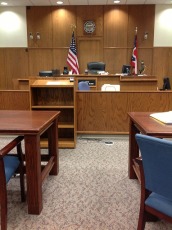 On legal TV shows, the actors spend a lot of time in the courtroom—usually in an endless series of trials that seem to happen only days or weeks after arrest. Most people don’t realize that the criminal court process has a series of court dates leading from arrest up to trial, and the whole process can take several months. Each court date serves a different purpose, and if you are currently dealing with a criminal case, here is what you can expect:
On legal TV shows, the actors spend a lot of time in the courtroom—usually in an endless series of trials that seem to happen only days or weeks after arrest. Most people don’t realize that the criminal court process has a series of court dates leading from arrest up to trial, and the whole process can take several months. Each court date serves a different purpose, and if you are currently dealing with a criminal case, here is what you can expect:
- Initial Appearances: If you were arrested, you will often be held until this hearing at the jail. First, the Judge must find that there was probable cause for arrest (sufficient information to believe a crime was committed). Then, the Judge will inform you of your rights, determine your bond amount and any special conditions of release.
- Arraignment: At this hearing, the Judge will read to you the charges that have been filed against you. These may be different from the charges that you were initially arrested on. You will then enter a preliminary plea. Unless the State Attorney or Judge makes an extremely favorably offer, the plea is usually Not Guilty so that you can review the evidence against you with an attorney to discuss possible strategies and motions in your case. At this hearing, the Judge will appoint an attorney if you cannot afford one. If you are already represented by an attorney, they will excuse you from appearing at this court date and you do NOT need to attend.
- Case Management: Primarily for trying to resolve 3rd degree felonies, this hearing is only in Circuit Court. At this hearing, the Judge will try to resolve any discovery issues and accept early plea resolutions. You MUST attend this hearing. Your appearance CANNOT be excused.
- Pre-Trial Conference: Usually about 2 weeks before your Trial date, this hearing provides an update to the Judge about whether the case is ready for trial or if it has issues. During this hearing, the attorneys will tell the Judge if they are 1.) ready for trial, 2.) setting the case for a plea, 3.) asking for more time by continuing the case, 4.) setting the case for motions or 5.) facing issues with depositions/discovery/witnesses, etc. that are keeping the case from being ready for trial. If you are represented by an attorney, they can excuse you from court with a signed motion, and you do NOT need to attend if you have signed the waiver of appearance.
- Docket Sounding: This court date often takes the place of Case Management or Pre-Trial Conference. Similar to a Pre-Trial Conference, the purpose of this hearing is to announce whether the case is ready for trial, being set for a plea, or if there are other issues in the case. You MUST attend this hearing, your appearance CANNOT be excused.
- Trial: At this hearing, your case may be one of dozens scheduled for trial. Cases often end in pleas, are sometimes dropped by the state, continue to another trial period, or end up on the list of cases ready for trial. If your case proceeds to trial, you will sit with your attorney as they select a jury, make opening arguments, cross examine the State’s witnesses, and make closing arguments. This is likely the ONLY hearing that the State witnesses must show up for, and they will usually only show up shortly before they testify, so don’t expect to see them at the beginning of trial. Trials can also last several days, or even weeks, so make sure that you discuss with your attorney how long they estimate trial will take so that you can take time off accordingly. At the end of trial, the jury will determine if they believe the State has proven the charges against you. If you are found Not Guilty, the charges against you are dismissed, the bond will be released back to you, and you are free to leave. If you are found Guilty of your charges, any combination of the charges, or of lesser charges, the Judge has the option to sentence you immediately, delay sentencing for another date, or remand you (have you placed into jail) until you are sentenced. You MUST attend your trial date. Your appearance CANNOT be excused.
Questions about your upcoming court dates? Call Colbert Law at 407-412-7234.
